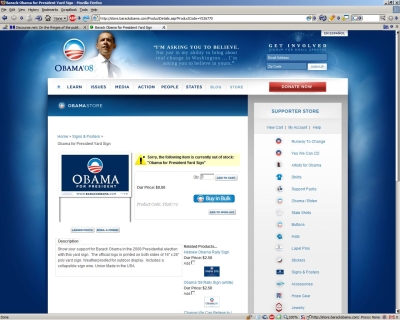I previously posted a link to a (locally hosted) copy of the Bailout Bill, aka the Emergency Economic Stabilization Act. For those who can’t wade through the 100+ pages on very short notice, here’s the text of a brief staff summary, as provided by the Senate Majority Leader’s office.
SECTION-BY-SECTION ANALYSIS OF THE LEGISLATION Section 1. Short Title.
“Emergency Economic Stabilization Act of 2008.”
Section 2. Purposes.
Provides authority to the Treasury Secretary to restore liquidity and stability to the U.S. financial system and to ensure the economic well-being of Americans.
Section 3. Definitions.
Contains various definitions used under this Act.
Title I. Troubled Assets Relief Program.
Section 101. Purchases of Troubled Assets.
Authorizes the Secretary to establish a Troubled Asset Relief Program (“TARP”) to purchase troubled assets from financial institutions. Establishes an Office of Financial Stability within the Treasury Department to implement the TARP in consultation with the Board of Governors of the Federal Reserve System, the FDIC, the Comptroller of the Currency, the Director of the Office of Thrift Supervision and the Secretary of Housing and Urban Development.
Requires the Treasury Secretary to establish guidelines and policies to carry out the purposes of this Act.
Includes provisions to prevent unjust enrichment by participants of the program.
Section 102. Insurance of Troubled Assets.
If the Secretary establishes the TARP program, the Secretary is required to establish a program to guarantee troubled assets of financial institutions.
The Secretary is required to establish risk-based premiums for such guarantees sufficient to cover anticipated claims. The Secretary must report to Congress on the establishment of the guarantee program.
Section 103. Considerations.
In using authority under this Act, the Treasury Secretary is required to take a number of considerations into account, including the interests of taxpayers, minimizing the impact on the national debt, providing stability to the financial markets, preserving homeownership, the needs of all financial institutions regardless of size or other characteristics, and the needs of local communities. Requires the Secretary to examine the long-term viability of an institution in determining whether to directly purchase assets under the TARP.
Section 104. Financial Stability Oversight Board.
This section establishes the Financial Stability Oversight Board to review and make recommendations regarding the exercise of authority under this Act. In addition, the Board must ensure that the policies implemented by the Secretary protect taxpayers, are in the economic interests of the United States, and are in accordance with this Act.
The Board is comprised of the Chairman of the Board of Governors of the Federal Reserve System, the Secretary of the Treasury, the Director of the Federal Home Finance Agency, the Chairman of the Securities and Exchange Commission and the Secretary of the Department of Housing and Urban Development.
Section 105. Reports.
Monthly Reports: Within 60 days of the first exercise of authority under this Act and every month thereafter, the Secretary is required to report to Congress its activities under TARP, including detailed financial statements.
Tranche Reports: For every $50 billion in assets purchased, the Secretary is required to report to Congress a detailed description of all transactions, a description of the pricing mechanisms used, and justifications for the financial terms of such transactions.
Regulatory Modernization Report: Prior to April 30, 2009, the Secretary is required to submit a report to Congress on the current state of the financial markets, the effectiveness of the financial regulatory system, and to provide any recommendations.
Section 106. Rights; Management; Sale of Troubled Assets; Revenues and Sale Proceeds.
Establishes the right of the Secretary to exercise authorities under this Act at any time.
Provides the Secretary with the authority to manage troubled assets, including the ability to determine the terms and conditions associated with the disposition of troubled assets. Requires profits from the sale of troubled assets to be used to pay down the national debt.
Section 107. Contracting Procedures.
Allows the Secretary to waive provisions of the Federal Acquisition Regulation where compelling circumstances make compliance contrary to the public interest. Such waivers must be reported to Congress within 7 days. If provisions related to minority contracting are waived, the Secretary must develop alternate procedures to ensure the inclusion of minority contractors.
Allows the FDIC to be selected as an asset manager for residential mortgage loans and mortgage-backed securities.
Section 108. Conflicts of Interest.
The Secretary is required to issue regulations or guidelines to manage or prohibit conflicts of interest in the administration of the program.
Section 109. Foreclosure Mitigation Efforts.
For mortgages and mortgage-backed securities acquired through TARP, the Secretary must implement a plan to mitigate foreclosures and to encourage servicers of mortgages to modify loans through Hope for Homeowners and other programs. Allows the Secretary to use loan guarantees and credit enhancement to avoid foreclosures. Requires the Secretary to coordinate with other federal entities that hold troubled assets in order to identify opportunities to modify loans, considering net present value to the taxpayer.
Section 110. Assistance to Homeowners.
Requires federal entities that hold mortgages and mortgage-backed securities, including the Federal Housing Finance Agency, the FDIC, and the Federal Reserve to develop plans to minimize foreclosures. Requires federal entities to work with servicers to encourage loan modifications, considering net present value to the taxpayer.
Section 111. Executive Compensation and Corporate Governance.
Provides that Treasury will promulgate executive compensation rules governing financial institutions that sell it troubled assets. Where Treasury buys assets directly, the institution must observe standards limiting incentives, allowing clawback and prohibiting golden parachutes. When Treasury buys assets at auction, an institution that has sold more than $300 million in assets is subject to additional taxes, including a 20% excise tax on golden parachute payments triggered by events other than retirement, and tax deduction limits for compensation limits above $500,000.
Section 112. Coordination With Foreign Authorities and Central Banks.
Requires the Secretary to coordinate with foreign authorities and central banks to establish programs similar to TARP.
Section 113. Minimization of Long-Term Costs and Maximization of Benefits for Taxpayers.
In order to cover losses and administrative costs, as well as to allow taxpayers to share in equity appreciation, requires that the Treasury receive non-voting warrants from participating financial institutions.
Section 114. Market Transparency.
48-hour Reporting Requirement:
The Secretary is required, within 2 business days of exercising authority under this Act, to publicly disclose the details of any transaction.
Section 115. Graduated Authorization to Purchase.
Authorizes the full $700 billion as requested by the Treasury Secretary for implementation of TARP. Allows the Secretary to immediately use up to $250 billion in authority under this Act. Upon a Presidential certification of need, the Secretary may access an additional $100 billion. The final $350 billion may be accessed if the President transmits a written report to Congress requesting such authority. The Secretary may use this additional authority unless within 15 days Congress passes a joint resolution of disapproval which may be considered on an expedited basis.
Section 116. Oversight and Audits.
Requires the Comptroller General of the United States to conduct ongoing oversight of the activities and performance of TARP, and to report every 60 days to Congress. The Comptroller General is required to conduct an annual audit of TARP. In addition, TARP is required to establish and maintain an effective system of internal controls.
Section 117. Study and Report on Margin Authority.
Directs the Comptroller General to conduct a study and report back to Congress on the role in which leverage and sudden deleveraging of financial institutions was a factor behind the current financial crisis.
Section 118. Funding.
Provides for the authorization and appropriation of funds consistent with Section 115.
Section 119. Judicial Review and Related Matters.
Provides standards for judicial review, including injunctive and other relief, to ensure that the actions of the Secretary are not arbitrary, capricious, or not in accordance with law.
Section 120. Termination of Authority.
Provides that the authorities to purchase and guarantee assets terminate on December 31, 2009. The Secretary may extend the authority for an additional year upon certification of need to Congress.
Section 121. Special Inspector General for the Troubled Asset Relief Program.
Establishes the Office of the Special Inspector General for the Troubled Asset Relief Program to conduct, supervise, and coordinate audits and investigations of the actions undertaken by the Secretary under this Act. The Special Inspector General is required to submit a quarterly report to Congress summarizing its activities and the activities of the Secretary under this Act.
Section 122. Increase in the Statutory Limit on the Public Debt.
Raises the debt ceiling from $10 trillion to $11.3 trillion.
Section 123. Credit Reform.
Details the manner in which the legislation will be treated for budgetary purposes under the Federal Credit Reform Act.
Section 124. Hope for Homeowners Amendments.
Strengthens the Hope for Homeowners program to increase eligibility and improve the tools available to prevent foreclosures.
Section 125. Congressional Oversight Panel.
Establishes a Congressional Oversight Panel to review the state of the financial markets, the regulatory system, and the use of authority under TARP. The panel is required to report to Congress every 30 days and to submit a special report on regulatory reform prior to January 20, 2009. The panel will consist of 5 outside experts appointed by the House and Senate Minority and Majority leadership.
Section 126. FDIC Enforcement Enhancement.
Prohibits the misuse of the FDIC logo and name to falsely represent that deposits are insured. Strengthens enforcement by appropriate federal banking agencies, and allows the FDIC to take enforcement action against any person or institution where the banking agency has not acted.
Section 127. Cooperation With the FBI.
Requires any federal financial regulatory agency to cooperate with the FBI and other law enforcement agencies investigating fraud, misrepresentation, and malfeasance with respect to development, advertising, and sale of financial products.
Section 128. Acceleration of Effective Date.
Provides the Federal Reserve with the ability to pay interest on reserves.
Section 129. Disclosures on Exercise of Loan Authority.
Requires the Federal Reserve to provide a detailed report to Congress, in an expedited manner, upon the use of its emergency lending authority under Section 13(3) of the Federal Reserve Act.
Section 130. Technical Corrections.
Makes technical corrections to the Truth in Lending Act.
Section 131. Exchange Stabilization Fund Reimbursement.
Protects the Exchange Stabilization Fund from incurring any losses due to the temporary money market mutual fund guarantee by requiring the program created in this Act to reimburse the Fund. Prohibits any future use of the Fund for any guarantee program for the money market mutual fund industry.
Section 132. Authority to Suspend Mark-to-Market Accounting.
Restates the Securities and Exchange Commission’s authority to suspend the application of Statement Number 157 of the Financial Accounting Standards Board if the SEC determines that it is in the public interest and protects investors.
Section 133. Study on Mark-to-Market Accounting.
Requires the SEC, in consultation with the Federal Reserve and the Treasury, to conduct a study on mark-to-market accounting standards as provided in FAS 157, including its effects on balance sheets, impact on the quality of financial information, and other matters, and to report to Congress within 90 days on its findings.
Section 134. Recoupment.
Requires that in 5 years, the President submit to the Congress a proposal that recoups from the financial industry any projected losses to the taxpayer.
Section 135. Preservation of Authority.
Clarifies that nothing in this Act shall limit the authority of the Secretary or the Federal Reserve under any other provision of law.
Title II–Budget-Related Provisions
Section 201. Information for Congressional Support Agencies.
Requires that information used by the Treasury Secretary in connection with activities under this Act be made available to CBO and JCT.
Section 202. Reports by the Office of Management and Budget and the Congressional Budget Office.
Requires CBO and OMB to report cost estimates and related information to Congress and the President regarding the authorities that the Secretary of the Treasury has exercised under the Act.
Section 203. Analysis in President’s Budget.
Requires that the President include in his annual budget submission to the Congress certain analyses and estimates relating to costs incurred as a result of the Act; and
Section 204. Emergency Treatment.
Specifies scoring of the Act for purposes of budget enforcement.
Title III–Tax Provisions
Section 301. Gain or Loss From Sale or Exchange of Certain Preferred Stock.
Details certain changes in the tax treatment of losses on the preferred stock of certain GSEs for financial institutions.
Section 302. Special Rules for Tax Treatment of Executive Compensation of Employers Participating in the Troubled Assets Relief Program.
Applies limits on executive compensation and golden parachutes for certain executives of employers who participate in the auction program.
Section 303. Extension of Exclusion of Income From Discharge of Qualified Principal Residence Indebtedness.
Extends current law tax forgiveness on the cancellation of mortgage debt.





